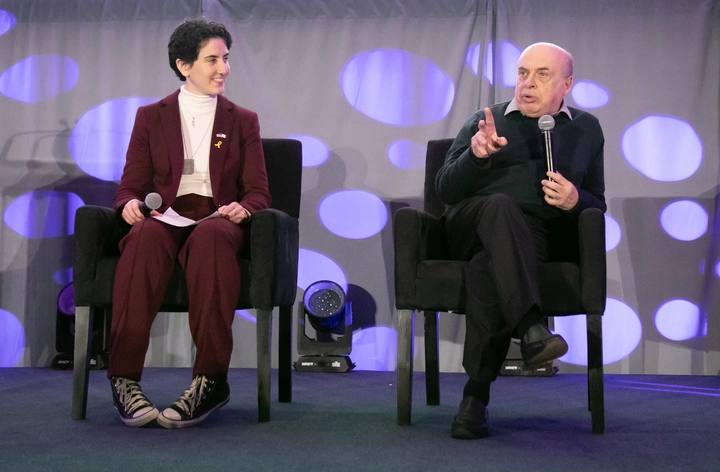At Hillel’s Israel Summit, Natan Sharansky Gives a Call to Action

Hillel International’s recent Israel Summit brought together thought leaders, visionaries, and inspiring speakers, along with over 800 students from North America. A standout moment was the plenary featuring the Hon. Natan Sharansky, a lifelong advocate for human rights and democracy, renowned for his role as a political dissident in the former Soviet Union.
In conversation with Talia Segal, Israel Summit committee member and president of Hillel at Georgia Institute of Technology, Mr. Sharansky spoke about his childhood in the USSR, the awakening of his Jewish identity, and his lifetime of work fighting for liberation and human rights.
“I had nothing Jewish in my childhood,” he explained. “The one Jewish thing we had in our lives was antisemitism. The conversations Jewish parents had with their children were not about brit milah, or prayers, or anything like that, but about career. You had to be the best.”
The creation of the State of Israel and the 1967 war transformed his perspective, when he realized there were Jews in diaspora everywhere, all part of one massive extended family. The difference between what was possible in Israel, compared to his life in the USSR, was stark.
When you have identity and freedom, you have liberation
Natan Sharansky
“When you have identity and freedom, you have liberation,” he said. This awakening led Mr. Sharansky to begin fighting for human rights and freedoms in his home country.
At the time, Jewish refusniks, citizens of the USSR who were denied permission to emigrate to Israel, were frequently arrested and accused of espionage. Mr. Sharansky was one of them. He was accused of high treason — a charge often punishable by death — and subsequently spent nine years in prison. Every day, he was told to condemn Zionism and Israel, and threatened with death if he didn’t do so. Still, he refused.
“The most difficult days,” he explained, were those when he felt isolated and alone, not the days when he was being threatened or tortured. But remembering that he was part of the Jewish struggle for liberation helped keep hope alive.
Following his release from prison, Mr. Sharansky wrote “Fear No Evil,” an autobiography that detailed his arrest and imprisonment, his work toward liberation, and his experience attempting to emigrate to Israel. It was that work that led Alexei Navalny, a vocal opponent of Russian President Vladimir Putin who was killed in prison this past February, to begin writing letters to Mr. Sharansky. Mr. Sharansky described Navalny as “the freest person in Russia.” Despite their many differences, the two were able to connect over their shared fight for liberation.
“All people are created b’tzelem Elohim, in God’s image,” Mr. Sharansky said. “I always felt that it is easy to cooperate with people and build relationships based on the mutual understanding and belief in human rights.”
Mr. Sharansky staunchly opposes the notion that anti-Zionism can be divorced from antisemitism, citing his own experiences of being denied basic human rights. He identified three key forms of antisemitism — demonization, delegitimization, and double standards — and pointed out that anti-Zionism most often takes those same forms. “I call them the 3Ds,” he said. “Because when you go to see a movie in 3D, you can see the whole picture.”
Today, following the rise in antisemitic incidents and anti-Israel protests on campuses following October 7, he believes this more strongly than ever.
“Instead of voices of sympathy and solidarity after the greatest pogrom in years, we saw a surge of anti-Zionism and antisemitism,” he said. “When [protestors] deny the right of Israel to exist, when they demonstrate from the river to the sea … that’s pure antisemitism.”
“We should have no hesitation to fight it,” he added.